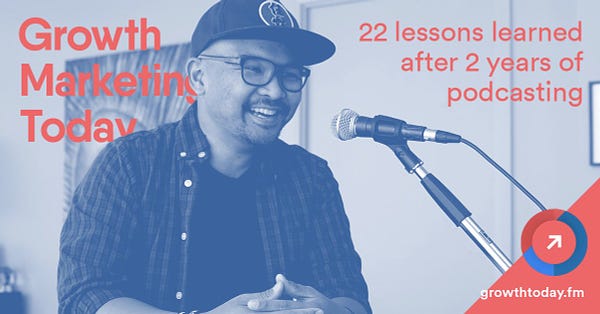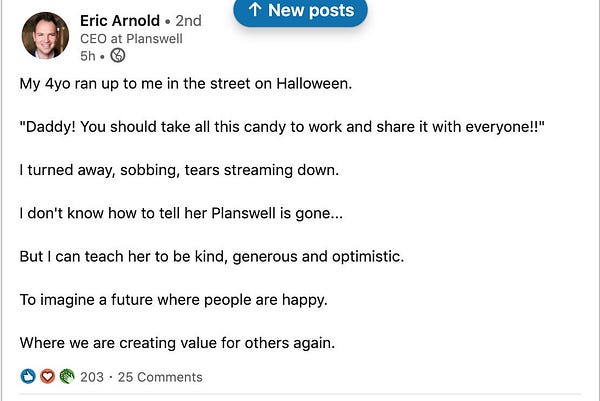Edition 22: No one gives a sh*t
Why the *? It’s becoming a trend in marketing to use ‘cuss words’ to grab attention. I could have said '“shit'“ but honestly it felt like a bit much & 🤚🏽 guilty of jumping on the bandwagon.
I’ve been thinking about the intersection of a few things:
Services business (like 42/Agency)
SaaS Products
Managed Services & Market Places.
In a services business, its a very hands-on model - I sit down with clients, provide a specific set of marketing/ops services that they pay for. I don’t make a product - there’s no engagement metrics/success metrics that I monitor.
With SaaS Products, you are disconnected from the customer’s daily experience & you design the product to be easy - intuitive & offer support/customer success to ensure they’re getting the most out of the product. Early on you may be hands-on with the first 10-50 customers but after that the more automation the onboarding/adoption process the better. The irony is though retention/adoption has become of the biggest challenges for modern-day products - they lead to churn.
Managed Marketplaces are a mix of the two. There’s a technology element (a store/marketplace) that showcases different services/products that you sell or connect with buyers on (think G2) but you also offer a white-glove service (I don’t know what I am looking for / I don’t want to do the research - can someone give me the top 3 options within these set of parameters). The value comes from the human touch for the higher value clients who pay a premium for the managed part.
I think the ‘managed’ services part is a lost opportunity in the current landscape of saas products. Before software products were sold & used on the internet, there was an implementation team involved (some probably still do) that would understand your business/goals & processes & implement + train your team on how to use the product & ensure you are getting value out of it.
You might argue customer success is that. I would argue Customer Success has become too much of a ‘30 day check-in’ but no real value. I’ve been on calls (from in-house & current consulting days) with Hubspot/Salesforce/Marketo reps but they are neither technical nor do they understand the business. They either go through a checklist or they try to sell you more stuff without actually helping you.
The reason people like Superhuman (the email client) - white-glove onboarding + great product experience. I am a past customer (I canceled) - and I appreciated that someone took time on the phone with me to understand my current email workflow (labels+canned responses+triage) and help me set up my Superhuman to reflect that. Sure they call them Growth people at Superhuman, that’s beside the point. If I had bought Superhuman & simply left to my own devices, I’d have been using it the same as I use Gmail - lots of mouse clicks & not really taking advantage of the advanced features. Had Superhuman built an in-app Onboarding exp (Intercom/Appcues etc) would I have taken the time to self learn? Probably not. Blocking time on my calendar & getting into the mental state of ‘I will learn how to use this thing properly’ with someone walking me through it helped. A lot. Otherwise, they wouldn’t be a sticky product - it is a great product no questions but the ‘training’ piece was the hook for me that kept me paying $40 a month for an email client because that 30 min call got me into the habit & helped me set up my inbox the right way.
This is why you should hire SME (subject matter experts) on your customer success teams not just ‘account managers’. Account Managers are great but they aren’t SMEs.
View your CS team as internal consultants who help solve problems for the customer with your product & make sure they’re getting the most out of it. If I am selling Hubspot & I don’t know how to use Hubspot - how can I help my customers make the most out of it? At 42/Agency I see all the time - clients buy Salesforce/Hubspot/Marketo & don’t use 90% of the product.
In the early days of Organimi, I was setting up accounts for people. We would have someone signup & I would then go in & upload some of their basic organizational info & create a basic Org Chart for them. Granted I am not an Organizational Design expert but we saw really good success with it. Later we rolled out a managed ‘concierge’ service - send us your messy HR system exports & we’ll turn it into beautiful Org charts. Payments can be made via Paypal (we didn’t have Stripe at the time).
Little known fact - I was the CS person at Organimi at first (circa 2012/2013)
👋🏽 Pete (Databox) is subscribed to this so I’ll add this - I sometimes wish Databox had someone who could just set up all my Dashboards & Data pipes for me & schedule it out to send to clients & such. It’s not feasible given the economics of the business but something that’s been on my mind.
I’ve been reading StartupLand (Zendesk story - thanks for the recommendation Wes) and a couple of points stood out:
They hired marketing early — We recruited Amanda Kleha, who had worked at Google after the Postini acquisition but was looking for a smaller startup where she could have more impact. She was an all-around marketing person and came highly recommended. Alex said, “I don't understand why we need marketing right now,” and I'm not sure I knew why either…
They focused on sales (but they called them Customer Advocates who called customers in trial — We were really committed. Michael Hansen gave his personal phone number to at least ten thousand trial customers. Matthew proactively called customers
DDH (Ruby On Rails + BaseCamp) worked with Mikkel before Zendesk! I had to let go was David Heinemeier Hansson—who later became the father of Ruby on Rails, the framework we later built Zendesk on, and a co-founder of 37signals (now Basecamp), which became an inspiration for a whole generation of software startups, including Zendesk.
This one was something very relevant for my current time as I look to hire someone — We have found that the first few hires are the most important ones you will ever make. They may not all stick around, but those who do not only will set the initial path for the company but will also help establish the initial voice and style of the company. They will become the platform for the company culture.
Something I struggled with when I moved to Canada — The reality, which we learned after some experience, is that Americans are just much better at selling themselves. In fact, we learned that some of them oversold themselves. This doesn't really happen in Denmark, where people understate their abilities, but here it was a routine practice. We had to learn to expect it—and to determine other ways to measure skills and screen for talent.
Predictable Revenue (Aaron Ross) made the case for specialized Sales roles (SDR/BDR & AE’s) but sometimes it doesn’t make sense and it’s better to run full cycle sales. I am not a Sales expert but I have opinions & have worked with sales for a while.
I was having a discussion with a prospect. They sell to property managers & the total addressable market is maybe 50,000 commercial property management companies in the US. They don’t have SDR teams and the VP Revenue asked me if I thought they needed one. - They don’t need to qualify/prospect high volume of folks so the AE runs the full sale cycle (prospecting & closing) & it works for them.
This recent Linkedin discussion on the topic brought it to top of mind for me - though I don’t agree with his premise.
Ramli (Growth Marketing Today) shared some incredible lessons from his 2 years of podcasting (whew 2 years!) & I am a happy sponsor:


Karen (COO Intercom) talks about a lot of things like scaling, intuit & the best marketing investment she made at Intuit. Jump to 21:45 to listen to why as her major decision as an SVP at Intuit she spent her marketing budget to hire engineers to improve the first user experience of Mint (and it paid off) but she got a lot of pushback from other marketing leaders on spending her budget on engineering problems - but hey marketing/product the lines are blurring.
Peep (CXL) posted this on LinkedIn:
As a marketer, you can't be all data and tech. I'm saying this as a technical marketer myself. I spent the last 10 years doing conversion optimization and analytics. Your analytics/coding/automation/GTM/CDP/DMP/etc chops will only take you so far if your message falls flat. If your positioning is the same as everyone’s. If you don't have a hook. If you don't know how to speak to people and reach their hearts. No wonder that there's a massive sea of sameness, and most competitors look near-identical.
There's a lack of creativity. There's a lack of originality. Lack of authenticity and even honesty. Creativity is a muscle. Yes, some people have more creative talent, but you can put in regular practice. If you look at what creatives are doing and reading (e.g. The Artist's Way), there's a lot of emphasis on daily practice and exercise. Just like you should be putting in weekly learning hours to develop new technical skills, put in regular hours to train your creative instincts.
I am more technically inclined - especially because the creative side of any discipline can be very subjective (I don’t like this copy - that copy is better) and quickly become the HIPPO (Highest Paid Persons Opinion) problem.
I do agree with the lack of creativity - but that’s because every fucking B2B company has the same/similar playbook (no don’t get me started on Chatbots and how they are new playbook) - it’s really because 99% of the time brands are playing the short game.
There’s really nothing more I can say about the Planswell / Looka(LogoJoy) stories happening in Toronto but if you missed it:


Till next time,
Kamil




